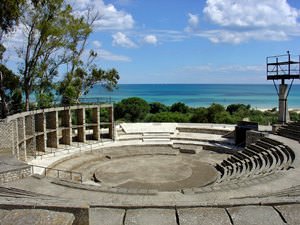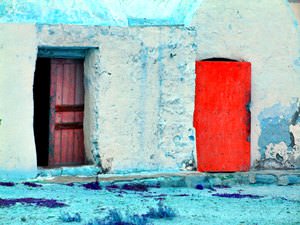
From a linguistic point of view, Tunisia is the most homogeneous and integral country of the modern day Maghreb. Almost all the locals can speak the so-called Tunisian dialect which is of Arabic extraction. Among linguists, it is known as Derja. By its linguistic structure, this dialect some sort of derivative of the classical Arabic language. However, in practice, most words in the dialect are structurally and phonetically unlike classical Arabic. Most likely, this was influenced by the history of the formation of Tunisia as a state and its geographical location. Periodic migration and a change of government within the state also left a mark on the linguistic sphere of Tunisia. To date, you will even find in their dialect borrowed words from French and Italian, German and Spanish, and even some adverbs from Berber.
These spots really worth the attention of a real traveler-researcher.
…
Read further
Despite this, the Arabic language is regarded as the only official language in the territory of Tunisia. All official documentation is compiled with it. Deputies and other public office holders communicate in it. In addition, signboards and advertising information, as well as the menu in restaurants and price lists in shops are written in Arabic. Children, beginning from their first class at school are taught using classical Arabic, which is also actively used in trade relations. Every literate Tunisian speaks excellent classical Arabic. In everyday life however, the local Darius dialect is employed. In view of the development of the tourism business, all the service personnel working in this sector are bona fide polyglots. They can clearly communicate in English, French, German and even Russian.
Not so long ago, by historical standards, there was a French protectorate in Tunisia. The French language at that time was recognized as a state language, while also widespread in all spheres of the national life of the Country. Even though Tunisia has gained independence, the language continues to thrive and develop in the Country. It is still highly regarded and spoken by most of the local population. Even at school, it is studied from the second grade. In some restaurants and cafes in major tourist cities, the menu besides being in Arabic is also written in French. Until now, the authorities of Tunisia did not prohibit the production of printed publications and literature in classical French. Copyright www.orangesmile.com
The best way to get acquainted with culture of Tunisia is to make excursions to its largest cities. In every of them travelers will find various …
Read further
Islam is considered the predominating religious direction in Tunisia. According to the data of last year, almost 95% of the local population consider themselves to be believers; most of them consider themselves to be Muslims. In addition, Judaism and even Christianity are common in the country. The Constitution of Tunisia guarantees freedom and the right to choose one’s religion. Any manifestation of intolerance towards a religious faith is punishable. It is worth noting that the religion of Islam as is practiced in Tunisia is quite diverse. The fact is that many Tunisian Muslims are Sunnis, but those who live on the island of Djerba profess a religion based on orthodox Islam.
![Djerba Djerba]()
Religious education in the country is at a very high level. From childhood, children are taught to help one’s neighbor, so practically almost every Muslim passing by the poor, seeks to give alms. That aside, thanks to modern Western trends, in the territory of Tunisia there are those who do not want to follow the rules of many generations of their ancestors and wish to simply disregard any religious denominations. It is worth noting that the local population is very demanding regarding the fulfillment of the basic canons of their religion. It is for this reason that tourist while staying in a Muslim country, are recommended to observe some rules adopted in this religious direction. For example, women should not wear revealing outfits. The shoulder or cleavage zones should likewise not be exposed.
Tunisia is dominated by a subtropical climate. The Mediterranean Sea is the main influence on the formation of weather conditions. Summer in the …
Read further
Within this sufficiently large and powerful Muslim society that is Tunisia, there are still some ethno-confessional groups. All of them put together however, do not exceed 1% of believers in the country. It is worth noting that such religions do not experience development. Belonging to this category are the Berber-speaking Ibadis, renegade Christians and even the Hanafis, who consider themselves to be the true descendants of the Turks. There is likewise also the Jews who were expelled from Spain 6 centuries ago. Of course, during the Second World War most of them did move to Israel and France, but to date, there are still at least 20,000 Jews in Tunisia. They zealously guard their religion and try to pass it on to every new generation.
Tunisia guide chapters
1
2
3
4
5
6
7
 From a linguistic point of view, Tunisia is the most homogeneous and integral country of the modern day Maghreb. Almost all the locals can speak the so-called Tunisian dialect which is of Arabic extraction. Among linguists, it is known as Derja. By its linguistic structure, this dialect some sort of derivative of the classical Arabic language. However, in practice, most words in the dialect are structurally and phonetically unlike classical Arabic. Most likely, this was influenced by the history of the formation of Tunisia as a state and its geographical location. Periodic migration and a change of government within the state also left a mark on the linguistic sphere of Tunisia. To date, you will even find in their dialect borrowed words from French and Italian, German and Spanish, and even some adverbs from Berber.
From a linguistic point of view, Tunisia is the most homogeneous and integral country of the modern day Maghreb. Almost all the locals can speak the so-called Tunisian dialect which is of Arabic extraction. Among linguists, it is known as Derja. By its linguistic structure, this dialect some sort of derivative of the classical Arabic language. However, in practice, most words in the dialect are structurally and phonetically unlike classical Arabic. Most likely, this was influenced by the history of the formation of Tunisia as a state and its geographical location. Periodic migration and a change of government within the state also left a mark on the linguistic sphere of Tunisia. To date, you will even find in their dialect borrowed words from French and Italian, German and Spanish, and even some adverbs from Berber.
 Religious education in the country is at a very high level. From childhood, children are taught to help one’s neighbor, so practically almost every Muslim passing by the poor, seeks to give alms. That aside, thanks to modern Western trends, in the territory of Tunisia there are those who do not want to follow the rules of many generations of their ancestors and wish to simply disregard any religious denominations. It is worth noting that the local population is very demanding regarding the fulfillment of the basic canons of their religion. It is for this reason that tourist while staying in a Muslim country, are recommended to observe some rules adopted in this religious direction. For example, women should not wear revealing outfits. The shoulder or cleavage zones should likewise not be exposed.
Religious education in the country is at a very high level. From childhood, children are taught to help one’s neighbor, so practically almost every Muslim passing by the poor, seeks to give alms. That aside, thanks to modern Western trends, in the territory of Tunisia there are those who do not want to follow the rules of many generations of their ancestors and wish to simply disregard any religious denominations. It is worth noting that the local population is very demanding regarding the fulfillment of the basic canons of their religion. It is for this reason that tourist while staying in a Muslim country, are recommended to observe some rules adopted in this religious direction. For example, women should not wear revealing outfits. The shoulder or cleavage zones should likewise not be exposed.


